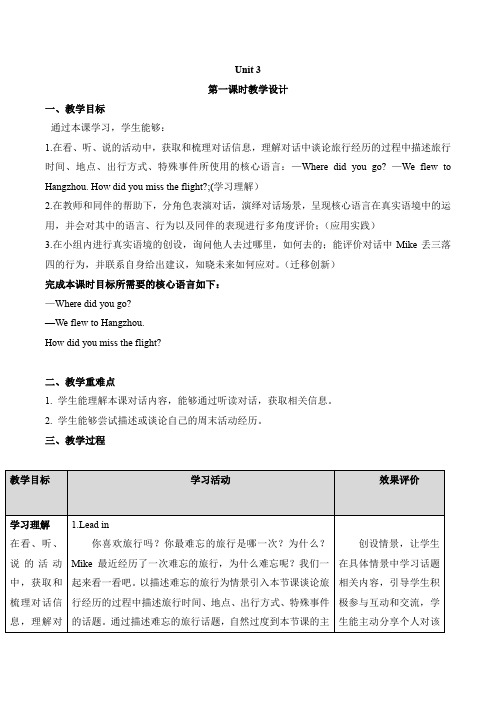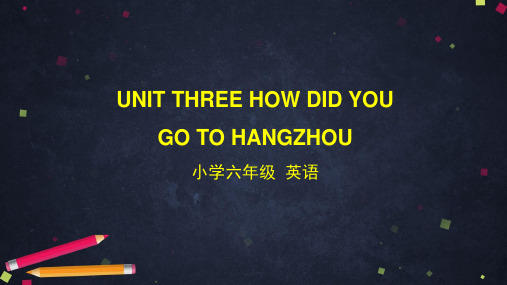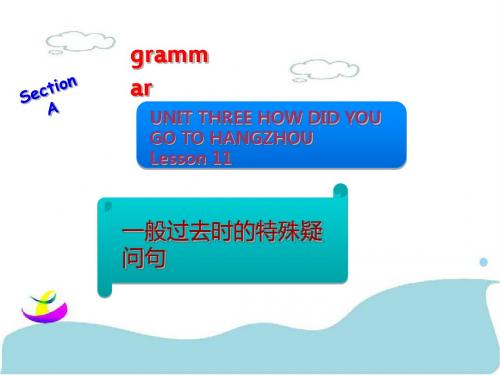UNIT THREE HOW DID YOU GO TO HANGZHOU Lesson 10 习题1
- 格式:doc
- 大小:37.50 KB
- 文档页数:2

Unit 3 How did you go to Hangzhou?Lesson 9词汇:see看,看见Monday星期一hotel旅馆angry生气的,愤怒的短语:took a trip 去旅行last week上周missed our flight 错过了我们的航班came back late 回来晚了flew to Hangzhou 乘飞机去杭州at the airport 在机场left my passport 丢了护照in the hotel 在宾馆missed work 耽误了工作missed school 耽误了上学last Sunday afternoon上周日下午on Monday 周一last weekend 上周末yesterday afternoon 昨天下午drove to Xiangshan 开车去香山on Friday morning 周五早上took the train to Tianjin 坐火车去天津句型:Where did you go last weekend ?你上周末去哪儿了?We flew to Hangzhou.我们坐飞机去杭州了。
语法点:1. 本课出现的动词过去式及原形,括号内是原形。
didn’t (don’t), took (take), missed(miss) 错过,flew (fly)坐飞机,found(find) 发现,left(leave) 遗落,went (go) 去,were(are)2. We flew to Hangzhou. 我们坐飞机去的杭州。
⚫flew的原形是fly,作动词时也有“乘坐飞机”的意思。
课文复述:Mike and his parents took a trip to Hangzhou last weekend. On their way home, Mike found he left his passport in the hotel and they went back for it. They missed their flight and came back late.Mike’s parents were angry because they missed work and Mike missed school on Monday.Lesson 10词汇:hill小山west西方,西部around在…周围短语:went there by air 坐飞机去那fantastic极好的visited many places 参观了许多地方saw green hills 看了青山small bridges小桥the West Lake 西湖do some shopping 购物went around the lake by bike环湖骑行bought some silk dresses买了一些丝绸连衣裙bought some green tea买了一些绿茶the train station 火车站the Spring Festival Fair春节庙会by air 坐飞机by bus 坐公交车by subway 坐地铁by taxi 坐出租by train 坐火车on foot 步行句型:How did you go to Hangzhou?你怎么去杭州的?We went there by air. 我们坐飞机去的。

Unit 3第一课时教学设计一、教学目标通过本课学习,学生能够:1.在看、听、说的活动中,获取和梳理对话信息,理解对话中谈论旅行经历的过程中描述旅行时间、地点、出行方式、特殊事件所使用的核心语言:—Where did you go? —We flew to Hangzhou. How did you miss the flight?;(学习理解)2.在教师和同伴的帮助下,分角色表演对话,演绎对话场景,呈现核心语言在真实语境中的运用,并会对其中的语言、行为以及同伴的表现进行多角度评价;(应用实践)3.在小组内进行真实语境的创设,询问他人去过哪里,如何去的;能评价对话中Mike丢三落四的行为,并联系自身给出建议,知晓未来如何应对。
(迁移创新)完成本课时目标所需要的核心语言如下:—Where did you go?—We flew to Hangzhou.How did you miss the flight?二、教学重难点1. 学生能理解本课对话内容,能够通过听读对话,获取相关信息。
2. 学生能够尝试描述或谈论自己的周末活动经历。
三、教学过程Where didflewHow did youthe 要内容,学习谈论旅行经历的过程中描述旅行时间、地点、出行方式、特殊事件的相关表达。
2. Look and thinkMike上周末跟爸爸妈妈一起去了杭州,这次旅行怎么样?我们一起带着问题去看视频。
播放课文视频,组织学生带着问题看视频:How was Mike’s trip?3. Let’s watch播放课文视频,组织学生观看视频,跟读课文,并尝试理解课文大意;着重留意涉及前面提到的问题的语句,尝试组织语言,总结概括出答案。
通过视频,你对Mike的杭州之行有大概的了解了吗?接下来我们仔细听听他和Guoguo之间的对话。
4. Listen and pleteMike去了哪里?什么时候去的?怎么去的?和谁一起去的?在那里发生了什么?我们一起听一听,填一填。


UNIT THREE HOW DID YOU GO TO HANGZHOULesson 9习题2一、选择正确答案。
1. Loud music may make people ____ fast.A. to eatB. eatC. eatedD. eats2. I want ____ whether he’s all right.A. to knowB. knowC. knowingD. Knows3. Her teacher was annoyed ____ Tom because he made a lot of mistakes in the English Test Paper.A. atB. withC. inD. for4. Don’t forget _____ the tap when you don’t use it.A. turn offB. turn onC. to turn onD. to turn off5. The children were made ____ homework first.A. doB. to doC. didD. doing6. Don’t worry about her,Madam. Your daughter is ____ danger now.A. inB. outC. out ofD. at7. It’s ____ to play on the road. You’d better play in a ____ place.A. safe, dangerousB. safety, dangerC. safe, dangerD. dangerous, safe8. I ____ an expensive gift for my birthday, but I could not ____ it.A. accepted, receivedB. received, acceptC. accepted, receiveD. accepted, received9. Loud music makes me ____. So I feel very happy.A. energeticB. stressed outC. energyD. stress out10. I can’t wait ____ the present box.A. openB. to openC. openingD. opened二、阅读理解(A)阅读下面三则广告,回答问题。

Unit1What did you do this summer?一、核心词汇1.名词:farm农场Thursday星期四mountain山,山脉glasses眼镜problem问题2.动词:play玩swim游泳let让,允许3.形容词:strong健壮的,强健的4.限定词:some一些5.感叹词:please请二、拓展词汇1.名词:airport飞机场vacation假期camp(夏令)营,营地gift礼物fun乐趣weekend周末fox狐狸machine机器ox牛,公牛Xerox复印机2.动词:write写return归还visit访问,拜访learn学,学习;学会catch抓住fish钓鱼miss思念,想念enjoy享受……乐趣;喜欢win获胜;赢得比赛carry拿,搬,带3.形容词:interesting有趣的,有意思的best最好的4.副词:also也,同样first第一;首次5.代词:both二者,两者都6.介词:into进入,到……中during在……期间;在……过程中7.短语:go back to回去have a great time玩得开心,过得愉快no wonder难怪,怪不得come back from从……回来one day一天good for you你真好a lot of许多,大量buy…for给……买……a pair of一双;一条;一副三、核心句型1.—What did you do this summer?你今年夏天干什么了?—Oh,I went back to Canada.噢,我回加拿大了。
解读:这是询问某人做过什么的句型及其回答,是what引导的一般过去时的特殊疑问句。
举一反三:—What did you do last Thursday?你上星期四做什么了?—I played football.我踢足球了。
2.—When did you come back from your summer camp,Lingling?玲玲,你什么时候从夏令营回来的?—I came back last Thursday.我上星期四回来的。

UNIT HOW DID YOU GO TO HANGZHOU?满分:100分时间:60分钟得分:听力部分一、听录音,选出单词或短语。
(10分)( )1. A.Monday B.Thursday C.Saturday ( )2. A.miss B.Mr C.missed ( )3. A.drove to B.took the train C.flew to ( )4. A.bridges B.hills C.houses ( )5. A.by ship B.by subway C.by air 二、听录音,给图片排序。
(10分)( ) ( ) ( )( ) ( )三、听录音,补全句子。
(10分)1. We to Hangzhou last week.2. I missed my passport in the .3. We went to the Lake by bike.4. They went the lake on foot.5. Some people invented the vehicles.笔试部分四、根据图片写单词。
(10分)1. I didn’t go to school on .2. It’s a comfortable in Hangzhou.3. She rode a to the farm.4. They went to Canada by .5. Mr Bell invented the .五、选择正确答案。
(10分)( )1. —was your trip to Tianjin?— It was fantastic.A.WhatB.HowC.Who( )2. They didn’t me on Friday.A.lookB.look atC.see( )3. Your brother upset.A.must beB.must isC.be( )4. There were trees in front of the house.A.don’tB.noC.any( )5. It was not easy. It was .A.dangerousfortableC.difficult六、从方框中选择合适的单词补全句子。



Unit 3 How did you go to Hangzhou?单元计划单元教学目标:1. 能够围绕出行地点、方式进行简单询问,就出行方式的话题用两种不同的方式进行表述以及简单的询问。
2. 能够对过去发生的事情或进行的活动进行交流和描述,并对古人的出行方式进行简单的询问和讨论。
3. 能够听、说、读、写本单元要求掌握的11个单词,并能在相应的情景中应用;继续认读一些常用动词过去式的不规则变化。
4. 能够根据字母z在单词中发音为/z/的规律拼读单词。
5. 能够理解对话内容,并能朗读对话;读懂转述主题故事的语段,并尝试复述。
6. 能够在积极的情感体验中感受现代文明带给人们生活的便捷。
单元教学重难点:教学重点:1.理解,朗读对话。
2.能够围绕出行地点、方式进行简单询问,就出行方式的话题用两种不同的方式进行表述以及简单的询问。
教学难点:能够对过去发生的事情或进行的活动进行交流和描述,并对古人的出行方式进行简单的询问和讨论。
单元教学内容:Structure:Where did you go last weekend?We flew to Hangzhou.How did you go to Hangzhou?We went there by air.Who invented those vehicles?Some smart people did.Key vocabulary:last weekend, yesterday afternoon, on Friday morning, flew/ drove / took the train to Hangzhou, the Spring Festival Fair, the train station, by air/ bus / subway / taxi /train, on foot, those vehicles, some smart peopleLetters and sounds:Z, zebra, zip, zipper教学时间:4课时课题G6 U3 How did you go to Hangzhou? L9教学目标提问和回答出行目的地,并能够使用“I flew /drove /took 1. 能够运用“Where did you go … ?” 进行回答,并能够在情境中正确使用。

Unit 3 知识点Lesson 9一、动词原形及过去式(需背、默)do----did 做take----took 拿取miss----missed 错过go----went 去come----came 来fly----flew 飞find----found 寻找leave----left 离开,忘了带drive----drove 驾驶,开车二、重点词组(需背、默)1. take a trip ------ took a trip 旅行2. come back ------ came back 回来3. miss our flight------ missed our flight 错过了我们的航班4. go back ------ went back 回去5. last Sunday 上周日6. last weekend 上周末7. at the airport 在机场8. in the hotel 在旅馆9. on Monday 在周一10. angry 生气的三、重点句型(需背、默)1. ---- Where did you go last weekend? 上个周末你去哪儿了?---- We flew to Hangzhou. 我们飞去了杭州。
2. ---- Where did you go yesterday afternoon? 昨天下午你去哪儿了?---- We drove to Xiangtan. 我们开车去了香山。
3. ---- Where did you go on Friday morning?周五上午你去哪儿了?---- We took the train to Tianjin. 我们坐火车去了天津。
四、我会说How do you go to school?How did you go to Hangzhou?I go to school by bike. I went to Hangzhou by car.I was very happyI’m sorry to hear that. Your parents must be upset.Lesson 10一、动词及过去式(需背、默)buy—bought买am/is—was是are—were是go—went 去do—did 做visit—visited 参观see—saw 看见take—took 拿,获得feed—fed 喂养二、重点词组(需背、默)1. fantastic. 极好的2. go(went)there by air 坐飞机去那3. green hills 绿色的山4. the West Lake 西湖5. go(went)around 参观,走访6. sound special. 听起来很特别三、重点句型(需背、默)1.---- How did you go to Hangzhou? 你们怎么去杭州?---- We went there by air. 我们坐飞机去那儿。

小学英语(北京版)六年级上册Unit 3 HOW DID YOU GO TO HANGZHOU?听力部分(30分)一、根据所听内容,选择句中所含有的单词或短语。
(10分)( ) 1. A. angry B. happy C. surprised( ) 2. A. flew B. drove C. took( ) 3. A. hotel B. train station C. museum( ) 4. A. goat B. house C. horse( ) 5. A. plane B. telephone C. light二、根据所听到的对话,选择正确的答案。
(10分)( ) 1. Where did the boy go?A. B. C.( ) 2. How did the boy get there?A. B. C.( ) 3. When did they come back?A. B. C.( ) 4. What did he do?A. B. C.( ) 5. Who did he visit?A. B. C.三、听短文填空。
(10分)We took a trip to Hainan Island last 1 . We got there by 2 . It is so beautiful there. The sea is clean and 3 . We 4 in the water and 5 coconut milk. I was happy and like a fish. I hope I can come there again.笔试部分(70分)四、按要求写单词或短语。
(10分)1. fly(过去式)___________2. invention(动词)_________3. by air(同义词)_________4. by car(同义词)__________5. fast(反义词)___________6. green tea(红茶)_________7. horse(复数)____________ 8. difficult(反义词)__________9. ride(现在分词)__________ 10. our(人称代词主格)_______五、找出划线部分发音不同的单词。


UNIT THREE HOW DID YOU GO TO HANGZHOULesson 11习题 1一、单项填空( ) 1. Whatever we do, first, we need to have a right _________ towards everything.A. abilityB. attitudeC. memoryD. concentrate( ) 2. The boring meeting made everyone feel very_________.A. surpriseB. happyC. boredD. moved( ) 3. —Sam, our daughter has grown up. Should we do everything for her?—Oh, dear. Let her _________ her own life.A. behaveB. shareC. organizeD. do( ) 4. Scientists can’t _________ on why we need to sleepA. dependB. explainC. guideD. agree( ) 5. —It’s generous _________ you to donate so much money to Project Hope.—Thank you. I think it important _________ me to help poor children go to school.A. to; forB. for; offC. of; forD. of; of( ) 6. The amount of sleep we need _________ different from person to person.A. have beenB. isC. areD. has been( ) 7. —You look so sleepy. I think you shouldn’t often stay up.—Yes, I find the less I sleep, _________ I do in the work during the day.A. the moreB. the betterC. the fewerD. the worse( ) 8. Please don’t forget _________ the room while I am away.A. cleanB. to cleanC. cleanedD. cleaning( ) 9. —Let’s go to the KFC, OK?—We’d better eat junk food _________ possible. It’s not healthy.A. as little asB. as much asC. as often asD. as well as( ) 10. Though it’s difficult for me to learn English well, I won’t _________ because it’s very important.A. give it outB. give up itC. give it upD. give it away( ) 11. —Miss Li, I have trouble with my English. What can I do?—Study harder from now on. It’s never _________ late _________ catch up with yourclassmates.A. too; toB. so; thatC. as; asD. such; that( ) 12. David used to prefer junk food._________, with the help of his parents, he eats less such food now.A. ButB. HoweverC. SoD. Or( ) 13. —Hi, Lucy. Would you like to _________ with me in the shopping center this weekend?—Certainly, I’d like to.A. help outB. get throughC. hang outD. give out( ) 14. —We often talk with each other on QQ.—Really? Will you please show me _________ it?A. what to useB. how to useC. what I can useD. how can I use( ) 15. —I think teenagers can go out at night.—_________ . It’s not safe enough.A. I agreeB. I think soC. I don’t knowD. I disagree二、单词拼写1. People in Taiwan got a large a _________ of help from people all over our country.2. I tried to persuade her, but with little or no e _________. She didn’t care what I said at all.3. I think most of the kids are often told not to talk with s _________ on the street.4. Tom is a dishonest boy, so please do not t _________ him any more.5. Teachers discovered that he had a smart b_________. He could do some math problems that histeachers couldn’t do.。

教学基本信息课题Unit3How did you go to Hangzhou? Lesson11是否属于地方否课程或校本课程学科英语学段:高年级年级六年级相关领域出行方式教材出版社:北京出版社出版日期:教学设计参与人员姓名单位联系方式设计者实施者指导者课件制作者其他参与者指导思想与理论依据根据英语课程二级目标的要求,基于促进学生全面发展的基本理念,以培养学生的综合语言运用能力为目标,在培养学生英语语言能力的同时进一步促进学生思维能力的提高,促进学生在语言、情感、认知、文化意识、学习能力、道德与价值观等多方面的综合发展。
结合以上内容要求及本校六年级学生的实际情况设计本课,旨在培养学生在特定情景中恰当运用语言的能力。
教学背景分析教材分析:本单元是关于过去发生的事情或者进行的活动的表达。
学生已经系统学过特殊疑问句的句式;在前面课文复习了过去式的用法和结构;以上的上位知识都对新知学习起到加强和巩固作用。
本单元教学重点是在相应情景下能把以上各知识点综合起来就过去做某事、发明创造的话题灵活地进行运用。
本课侧重对发明事物的描述并借助对古人出行方式的学习,帮助学生以积极的情感感受现代文明带给人们的便捷。
本课要求学生能够对过去发生的事情或进行的活动进行交流和描述,并对古人的出行方式进行简单的询问和讨论;并掌握有关发明创造的问答句型:Who invented those vehicles?/Some smart people did.学情分析:我校六年级学生对英语学习有较浓厚的兴趣,但随着年龄的增长学生的课堂表达欲望不够强烈,且我校地处郊区,学生课外接触英语的机会比较少,仅限于在校的英语学习,所以在英语基础知识和技能方面较城区的学生都有所欠缺,同时充分调动学生的积极性,在特定的情景中使用重点句型结构也是本课的一个重点。
在Lesson9课中学生学习了关于出行地点及方式的询问,在Lesson10中学习用过去式把自己的旅行经历进行简单的描述,并能够在的情景中与他人进行地得体的交流。


Unit 3 How did you go to Hangzhou?一、核心词汇1. 动词: see看,看见2. 名词: Monday 星期一hill 小山hotel 旅馆horse 马west 西方;西部ride (乘车或骑车的) 短途旅程3. 形容词: angry 生气的,愤怒的many许多的,多的smart 聪明的4. 介词: around 在……周围二、拓展词汇1. 名词: flight 航班passport 护照air 天空silk 丝绸,丝织物subway 地铁vehicle 交通工具;车辆2. 动词: miss错过must 一定feed 喂travel 旅行invent发明;创造3. 形容词: fantastic 极好的special 特别的slow 慢的difficult 难的,困难的fortable 舒服的,舒适的safe安全的4. 短语: take a trip 旅游;去旅行fly to飞往,乘飞机前往三、核心句型1. — Where did you go? 你们去哪儿了?— We flew to Hangzhou. 我们乘飞机去杭州了。
解读: 此句是 where引导的一般过去时的特殊疑问句,用来询问某人去哪里了。
举一反三: — Where did you go? 你去哪儿了?— I went to the supermarket. 我去超市了。
2. — How did you go to Hangzhou? 你们怎么去杭州的?— We went there by air. 我们乘飞机去的。
解读: 此句用来询问他人的出行方式。
举一反三: — How did he go to the zoo? 他怎么去动物园的?— He went there on foot. 他步行去那儿的。
3. How did you miss the flight? 你们怎么错过航班了?解读: how是特殊疑问词,意为“怎么,如何”。

Unit3 How did you go to Hangzhou?Lesson 10(练习及解析)北京课改版-六年级英语上册一、按要求写出单词或短语。
1.on foot(汉语) ______________2.by air(汉语) ______________3.绿山(英语) ______________4.blue water(汉语)_____________5.do some shopping(汉语) ______________6.buy (过去式) ______________7. new(反义词) ______________8.火车站(英语)______________9.乘地铁(英语)_____________10.green tea (汉语)______________【答案】1.步行 2.乘飞机 3.green hill 4.蓝水 5.去购物6.bought7.old8.the train railway9. by subway 10. 绿茶二、选择不同类的单词( )1. A. shop B. shoe C. hospital D. supermarket( )2. A. train B. bus C. buy D.ship( )3.A. need B. tomorrow C. next week D. today .( )4. A. on foot B. by taxi C. by bus D. go to school( )5.do some shopping B. green hills C. blue water D. small bridges【答案】1.B 2.C 3.A 4. D 5. A【解析】1.A.商店 B.鞋 C.医院 D.超市,所以应选B2.A火车 B.公共汽车 C.买 D.轮船,所以应选C.3.A需要 B.明天 C. 下周 D.今天,所以应选A4.A 步行 B.乘出租车 C.乘公共汽车 D去上学,所以应选D5.A 去购物 B绿山 C.蓝水 D.小桥,所以应选A.三、单项选择( )1.How did you go to Shanghai?—We went there ____air.A. byB. inC. at( )2.We went around the lake ____bike.A. onB. inC. by( ) 3. I ___ to school by bus yesterday.A. wentB. goC. goes( ) 4.There are so many ____on the farm.A. animalsB. fruitC. gifts( ) 5. Where did you go____?A. next weekB. last MondayC. Saturday【答案】1.A 2.C 3.A 4. A 5. B【解析】1.我们乘火车去那里, by air乘火车,应选A。

Lesson 9Guoguo: Hi, Mike! I didn't see you in school on Monday.Mike: My parents and I took a trip last weekend. We missed our flight and came back late. Guoguo: Where did you go?Mike: We fl ew to Hangzhou.Guoguo: How did you miss the flight?Mike: Last Sunday afternoon, at the airport I found I left my passport in the hotel. So we went back for it, and then we missed the flight.Guoguo: I'm sorry to hear that. Your parents must be upset.Mike: Yes, they were angry because they missed work and I missed school on Monday. —Where did you go last weekend?—We flew to Hangzhou.last weekend yesterday afternoon on Friday morningflew to Hangzhou drove to Xiangshan took the train to TianjinAsk how your classmates go to school.How do you go to school, Jack?I go to school by bus.Lesson 10Grandpa: How was your trip to Hangzhou, Mike?Mike: It was fantastic.Grandpa: How did you go to Hangzhou?Mike: We went there by air. We visited many places and saw green hills, blue water, small bridges, and old houses.Grandpa: Did you go to the West Lake?Mike: Yes, we went around the lake by bike.Grandpa: That sounds special. Did you d o some shopping?Mike: Yes, Mum bought some silk dresses and Dad bought some green tea.Lesson 11Yangyang: How did peopl e travel many, many years ago, Baobao?Baobao: They walked or rode horses because there were no bikes, cars, or buses. Yangyang: There were no ships, trains, or planes.Baobao: Travelling in the ol d days was very sl ow.Yangyang: Yes, it was difficult and dangerous, too.Baobao: Do you know who invented those vehicles?Yangyang: Some smart people did. Their inventions make our life easy and comfortable. Baobao: They also make travelling safe and fast.Lesson 12Now I can readMike and his parents took a trip to Hangzhou last weekend. When they were coming home, they found at the airport that Mike's passport was missing. Mike l eft it in the hotel. So they all went back for it. They missed their flight home and came back late. Mike's parents missed work, and Mike missed school on Monday.Mike told Grandpa on the phone about his fantastic trip to Hangzhou. He and his parents went there by air. They visited many places. They went around the West Lake by bike. His parents bought some silk dresses and green tea.Read and answer.What did Mike and his parents d o in Hangzhou? Why did they miss the flight?Now I can writearound saw Monday many horsesWest smart hotel hillsOur tour guide is a __________ young man. On __________ afternoon, he took us to the __________ Hills in Beijing. We __________ a lot of col ourful leaves on the __________. We walked __________ and took __________ photos. We saw people riding __________. We stayed there for three hou and went back to the __________ before dinner.。
UNIT THREE HOW DID YOU GO TO HANGZHOU
Lesson 10
习题 1
一、词形转换。
请你用所给词的适当形式完成下列句子。
1. Loud music makes ______ (I) tense.
2. Soft colors like pink and light blue make people relaxed,so they spend more time _____ (eat) their meals
3. Why don't we get something _____ (drink)?
4. I'd rather______ (play) tennis than swim.
5. They also have to know how _____ (make) money.
6. Here are some things they have learned from ______ (scientist) studies.
7. Sunglasses are used for _____ (keep) out the sun.
8. The students are ______ (confuse) about the ______ (confuse) problem.
9. I'm considering _____ (study) in Beijing or Shanghai.
10. I felt _______ (embarrass) when everyone looked at me.
二、完型填空。
根据短文内容,从各题的四个选项中选择一个最佳答案。
Focusing on Your Feelings
You can't tell your friends what's inside your backpack if you don't know what yourself is in there. Feelings are the 1._____ way. Before you can share 2.____ with anyone, you have to figure out what feelings you have.
3._____ a list of your feelings can help. You can do this
4.____ your head or by writing it out
on a piece of paper or even by drawing pictures. Is something bothering you? Does it make you sad or 5._____? Do you feel this emotion( 情感) only once in a while or do you feel it a lot of the time?/
When you're trying 6. _____your feelings, it might help to remember 7.____ that happened and think about how it 8.______ you feel. Then you can say, “I feel sad when my friend doesn't play with me”9._____ “I feel angry when my brother always wins at baseball.” This can help you figure out your own feelings. It also gives the person you're talking with more10. _____about what's bothering you?
1.A.same B .different C. good D. bad
2.A.it B. them C. this D. that
3.A.Make B. Making C. Take D. To take
4.A.on B. at C .in D. of
5.A.happy B. exciting C. angry D. interested
6.A.to figure out B. figure out C. find D. finding
7.A.anything B. everything C. nothing D. something
8.A.makes B. made C. to make D. make
9.A.and B. or C. but D. so
10.A.news B. massages C. information D. advice。